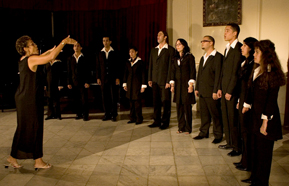12.12.7 Vocal Leo

Vocal Leo, a choral group founded in 1995 by the distinguished choral director Corina Campos, who has served as its director ever since. The creation of this choral group is a tribute to Leo Brouwer, Cuban guitarist, composer, and orchestra conductor. It is comprised of twelve singers.
Vocal Leo’s repertoire is extensive and includes contemporary works, as well as polyphonies, operas, and Spanish zarzuelas. It includes works by prominent Cuban and foreign composers such as Leo Brouwer, Matamoros, Lecuona, Monteverde, and Ravel, among many others.
In each of the group’s performances, not only music is present, but also choreographic and theatrical elements can be appreciated, a characteristic that has made it stand out from other Cuban choral groups, as it is unusual in this type of work. With the help of choreographer Leah Vázquez, who was a dancer with the National Folkloric Ensemble of Cuba, they prepare and stage the choreographies. The choreography is also characterized by the lyrical and operatic voices of some members.
Vocal Leo has performed at major national events in the field of choral music, such as the International Choir Festival, which takes place every two years in the eastern province of Santiago de Cuba. They have participated in several editions, earning a spot among audiences.
She has participated in numerous international choral festivals, including the Yucatán Festival and the Guadalajara Festival in Mexico; the International Choral Festival in Cuba; the International Competition in Catalonia; the International Habaneras and Polyphonies Competition in Torrevieja and the Tolosa Choral Mass Competition, both in Spain; the World Choral Music Olympiad in Bremen, Germany; and the 26th Cantonigrós International Music Festival in Catalonia. Corina has demonstrated the high quality that characterizes her work.
In 2001, they won the Cubadisco Award for their CD Aire Nocturno. At the 2004 World Choral Music Olympiad held in Bremen, Germany, where Vocal Leo competed for the first time, they won two gold medals in the popular music and a cappella categories for chamber choir. At this competition, they presented a complex and diverse repertoire, composed of works by Cuban composers such as Compay Segundo, Miguel Matamoros, and Roberto Valera, as well as foreign composers.
They won First Prize in the Mixed Choir category at the 26th Cantonigrós International Music Festival, held in Catalonia, and also second place in the popular music category. Choirs from more than thirty countries around the world participated in this event. The obligatory piece to be performed was the sardana, a typical Catalan dance, which they painstakingly prepared with the support of experts in this type of music. They accompanied their performance with short sardana steps and typical dance gestures. For the Popular Music category, they presented Miguel Matamoros’s El paralítico and Guido López’s El guayaboso. They also sang Monteverdi’s Madrigal and Leo Brower’s Cántico de Celebración.
They participated in the Barcelona Choral Conference, held a week before the Catalonia competition.
Vocal Leo’s past awards include: First Prize in the polyphony and music categories at the 1999 International Competition held in Catalonia; the Cubadisco Award (2001); two gold medals at the 2004 World Choral Music Olympiad in Bremen, Germany; and First Prize in the Mixed Choir category at the 26th Cantonigrós International Music Festival in Catalonia.








